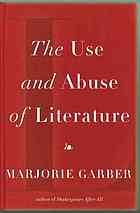
The Use and Abuse of Literature
کتاب های مرتبط
- اطلاعات
- نقد و بررسی
- دیدگاه کاربران
نقد و بررسی

Starred review from January 31, 2011
Harvard English professor Garber (Patronizing the Arts) leads an expedition through the archives of literature, rejecting expansion of the term's meaning to include all printed material or just about anything professional or research-based written in words. She sets out to reclaim the word, asserting that "the very uselessness of literature is its most profound and valuable attribute." Employing the history of literature to demonstrate the difficult work the act of reading entails, she draws on examples from authors as diverse as 15th-century Leon Alberti ("No art, however minor, demands less than total dedication") and Virginia Woolf on the difference between reading fiction and poetry; she even works in a reference to Oprah's book club. Garber describes approaches to literary scholarship such as the close reading of the New Criticism and deconstruction to justify her claim that how a text is studied and analyzed will determine if it is literature. She succeeds brilliantly at demonstrating that true literary reading is the demanding task of asking questions, not of finding rules or answers. Though the book is peppered with specialist terms like catachresis, Garber's erudition serves to educate general readers willing to embark on a moderately difficult trek with an authoritative guide.

January 15, 2011
In a cogent study, Shakespeare expert Garber (Visual and Environmental Studies/Harvard Univ.; Shakespeare and Modern Culture, 2008, etc.) wonders: Why read literature?
The ancient debate rages on: What is the purpose of literature? Does reading make us better citizens, or is literature's overall meaninglessness its greatest purpose? And what is literature anyway? Garber sifts through the salient arguments by writers over the centuries—including, among dozens of others, Plato, Horace, Shakespeare, Wilde, Marx and Václev Havel—to get at the deep-seated controversy involving literature's contribution to human edification. The author ultimately champions a work's sheer ability to get a rise out of the reader, to evoke questions and prompt risky, slippery, active responses. She looks at the so-called "canon" and how it has changed over time, not only in terms of who is included (e.g., the changing fortune of John Donne), but what passes for worthy literature—a ballad, a diary, a sexy novel like Lolita? Garber considers whether the study of literature actually kills the pleasure of reading for the ordinary reader, how reading a poem closely can relay the startling inspiration experienced by the author (and maybe change the world), how a work withstands the scrutiny of time ("literature is always contemporary because it is read by contemporary readers") and whether it matters that a work purporting to be "real" (such as a biography that slips into literary projection) turns out to be pure fiction. Finally, the author attempts a valiant resurrection of the well-turned metaphor—the "imaginative leaps" that actually render meaning—and the not-terribly-reassuring conclusion that the process of reading simply defies closure: "never ending, always opening outward into another scene."
Chockablock with examples and in-depth analysis, this can be savored by academics and lay readers alike.
(COPYRIGHT (2011) KIRKUS REVIEWS/NIELSEN BUSINESS MEDIA, INC. ALL RIGHTS RESERVED.)

October 15, 2010
Just how important is literature today? And what does that word even mean? Harvard University professor and noted author Garber takes on a topic near and dear to at least some of us. A good book club book for educated readers; with a seven-city tour.
Copyright 2010 Library Journal, LLC Used with permission.

March 15, 2011
Does literature make us happier, more ethical, more articulate? This is one of many incisive queries that drive this erudite and stimulating consideration of literatures place in our lives, a treatise composed with obvious pleasure by Harvard professor Garber, the author of such lively interpretative titles as Shakespeare and Modern Culture (2008). Garber is warmly clarifying and acerbically entertaining as she convincingly defends the academic study of literature as an essential facet of culture. Drawing on such literary notables as Wilde, Woolf, and Eliot, Garber assesses trends in literary theory and criticism versus popular reading tastes, noting that one eras trash becomes anothers classics. Declaring that interpretation is part of the life of the work of art, Garber encourages readers to be bold in responding to the rich allusiveness, deep ambivalence, and powerful slipperiness that is language in action. Both scholar and enthusiast, Garber makes her expertly argued praise for the delights of literary immersion and belief in the enduring power of literature deeply affirming. A welcome, wise, and edifying call back to literature itself rather than the paper versus digital debate.(Reprinted with permission of Booklist, copyright 2011, American Library Association.)

























دیدگاه کاربران